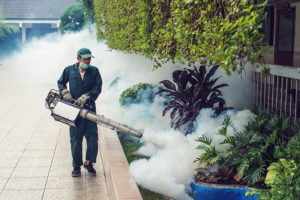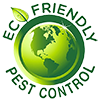Property Managers and landlords often choose the least expensive method of pest control for their apartments, hotels, and other multi-family dwellings. The goal, it seems, is to spend the least amount possible. Oftentimes, this involves a Do-It-Yourself approach. After all, what owner or tenant is going to complain about cutting costs?
Needless to say, this approach is neither wise nor cost-effective, especially when considering the potential legal liability and significant health issues involved.

A Denver woman says rat poison in her complex’s hot tub caused her hair to fall out. Other tenants claimed more serious health issues.
Rat Poison Gone Awry
In March of this year, a Denver landlord is now facing a class-action lawsuit over its failed pest control practices. The complex had been overrun by rats, and according to at least a dozen tenants, the landlord had applied rat poison carelessly throughout the complex. One woman is now suffering from hair loss which she believes is a direct result of the pesticide getting into the common area hot tub.
Subsequently, dead animals began to appear everywhere, and the landlord had been slow to remove the dead carcasses.

Careless use of rat poison and other pesticides can lead to dead animals cropping up everywhere.
Regardless of the outcome of this latest lawsuit, once the publicity gets out about pesticides and health issues, the unwanted attention can have a long-running negative impact on the landlord’s ability to keep the vacancy rate low. Left unchecked or mishandled, the damage to the reputation of the property can spiral out of control.
In July of last year, a landlord in Indiana was fined $14,625 for illegally using an unapproved pesticide and exposing it to his tenants. The landlord was also required to undertake an expensive cleanup operation and could also face criminal prosecution. Apparently, the landlord wanted to save money by killing all insects with one concentrated treatment, rather than hiring a professional pest control company to manage the problem and pay monthly.
Pesticide Notification Rules
Many states have recently enacted stricter notification laws pertaining to rental properties. In California, for example, a new law that went into effect in January of 2016 now requires owners and their employees to notify their tenants whenever they personally apply pesticides, as opposed to using a licensed professional. The new law further underscores California’s existing laws in effect since 1984 requiring pest control companies to provide notice to owners, agents, and residents in advance of any pesticide application at the property.

Do-It-Yourself pest control can create liability for owners and property managers
The High Cost of Fumigation
Hiring a large pest control company, is no guarantee that there will be no adverse consequences. Two very high-profile cases of pesticide poisoning in the past year involve one of the largest pesticide companies in the world. In both cases, the victims had suffered long-term and possibly permanent neurological damage. In the first case, family was vacationing in the U.S. Virgin Islands and became exposed to methyl bromide which has been banned from residential use since 2005 due to its extremely toxic nature. The company had apparently used the pesticide to fumigate a villa next to the family’s vacation home. CNN reported that the company may be close to paying the family $87 million in damages. In the second case, a Florida family fell ill after the same company had carelessly fumigated their home. In that case, the couple’s young son also suffered long-term neurological effects.

Lawsuits have sprung up recently regarding careless pesticide fumigation in multi-family dwellings and hotels.
Personal injury lawyers are keen to make victims aware of their right to sue their landlords and property managers if they have been injured or have become ill as a result of pesticides. Some pesticides trigger asthma, others harm the nervous system, while others may cause cancer. The harmful effects may become evident immediately, or take years to develop. Lawyers.com has even dedicated a webpage to the issue, entitled When to Sue When Pesticides Injure You.
Integrated Pest Management
One of the basic tenets of the EPA’s approach to Pest Management is what’s commonly known as Integrated Pest Management (IPM). The EPA describes Integrated Pest Management as “an environmentally friendly, common-sense approach to controlling pests.” At its core, IPM focuses on two things: 1) Pest Prevention, and 2) Use of Pesticides Only As Needed. Property owners and managers are encouraged to review and adhere to these fundamental principles. In doing so, property managers and owners stand to reap substantial benefits not only in terms of prevention and lesser use of pesticides, but also in reducing costs and greater health benefits for humans and other living things. For further details regarding the EPA’s Principles of IPM, visit this section of their website.
Pest Prevention

Property Managers all too often focus on killing pests rather than starting with a plan that prevents access.
An obvious but all too often overlooked technique in preventing pests—without pesticides— is simply to discourage them from physically entering or taking up residence on the property. This includes such practices as reducing clutter which provides shelter for pests, sealing all areas where pests can enter, installing barriers, removing sedentary water, cutting back overgrown vegetation, keeping rubbish sealed and some distance away from living areas, and last but not least, keeping residents informed and on the lookout.

Scattered Rubbish Is a haven for pests, providing collection of sedentary water and breeding grounds
Pesticides as Last Resort
The United States EPA may be the standard-setting agency when it comes to Integrated Pest Management, but a number of organizations have gone one step further to advocate a substantial reduction, or altogether elimination of the use of pesticides not only in multi-unit housing, but in schools and public parks as well.
One of the most vociferous opponents of the use of pesticides is, as its name indicates, the National Coalition Against Pesticides (NCAP), based in the Pacific Northwest. Their mission is “to protect community and environmental health and inspire the use of ecologically sound solutions to reduce the use of pesticides.” Their website lists a number of alternative techniques for individuals and property managers to help reduce pests and pesticides. Of particular concern are high occupancy multi-family housing and subsidized housing. Visit the NCAP website for further information.
Another leader in the promotion and advocacy of the EPA’s Integrated Pest Management is the Midwest Pesticide Action Center. While its mission is much broader than the NCAP’s, one of its primary activities is the education and training of landlords, housing managers, and residents on pesticide-free pest-management practices.
As a staunch advocate of the EPA’s Integrated Pest Management approach, we at All Natural Pest Elimination encourage every landlord and property manager to empower themselves through education and adoption of the EPA’s guidelines. And we practice what we preach. Beginning in 1991, our company has developed and perfected our own NatureLine™ chemical-free pest control products with a heart for the environment. Rather than using pesticides, we use products that contain natural oils and extracts that are highly effective, and offer property managers and their residents a safer alternative that can both reduce property managers’ liability and provide a more eco-friendly and healthy pest control treatment. Naturally derived, inorganic, and botanical, NatureLine™ products are considered Minimum Risk Pesticides and are exempt from registration with the U.S. Environmental Protection Agency under FIFRA section 25(b) regulations. Contact us today to learn more about our pest control solutions for homes, multi-family dwellings, schools, and businesses.
Get A Free Pest Control Inspection And Estimate From A Local Company Today
Resources:
- National Coalition Against Pesticides
http://www.pesticide.org/ - EPA: Pest Control & Pesticide Safety for Consumers
https://www.epa.gov/safepestcontrol - Midwest Pesticide Action Center
http://midwestpesticideaction.org - Beyond Pesticides
http://beyondpesticides.org


